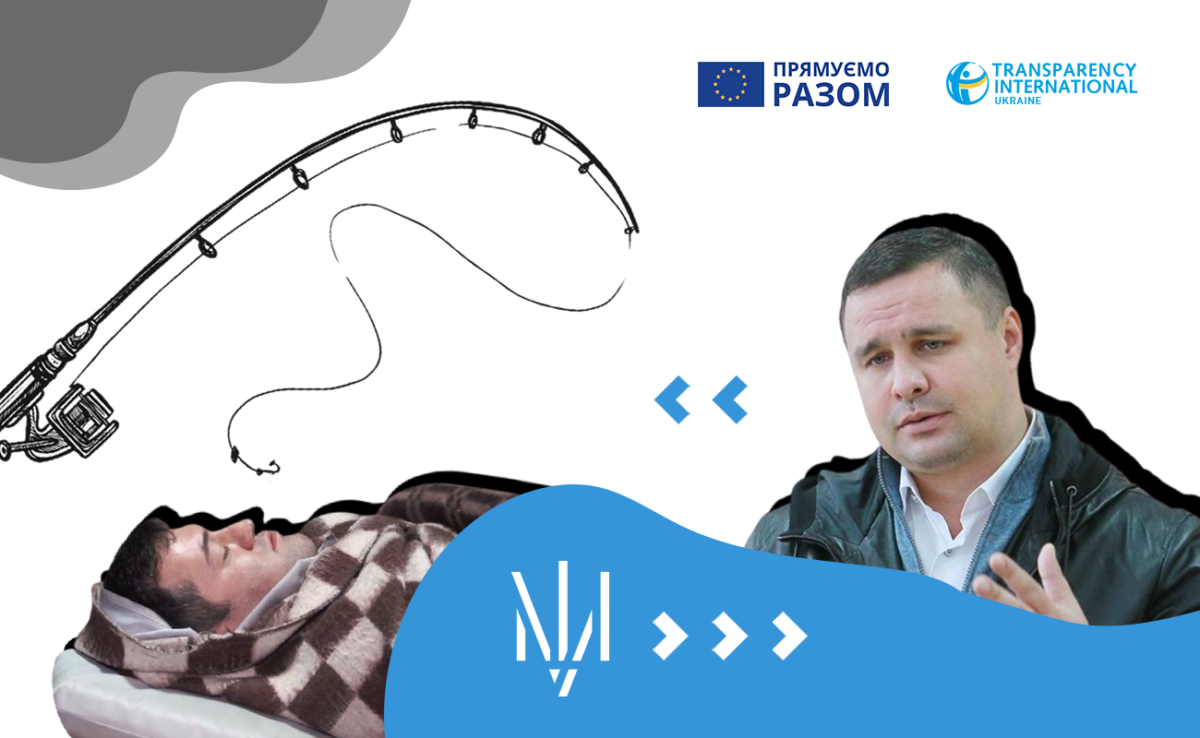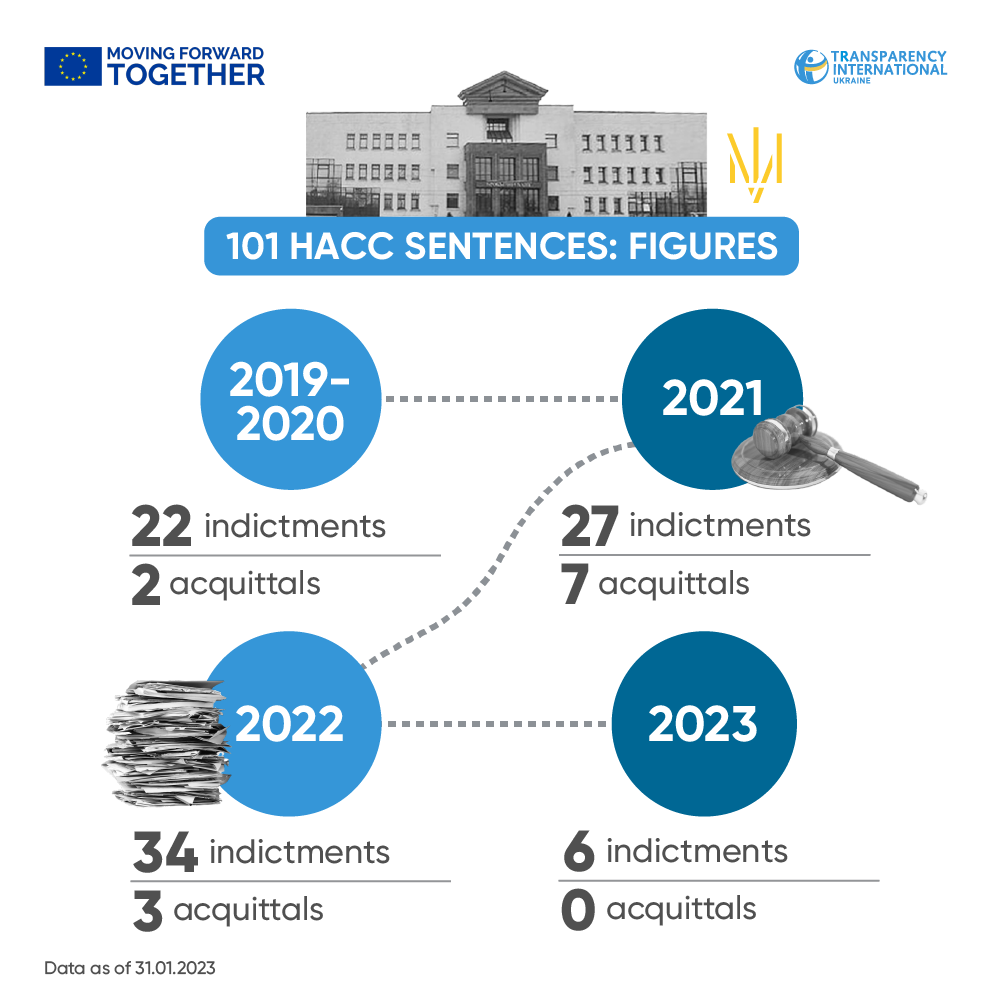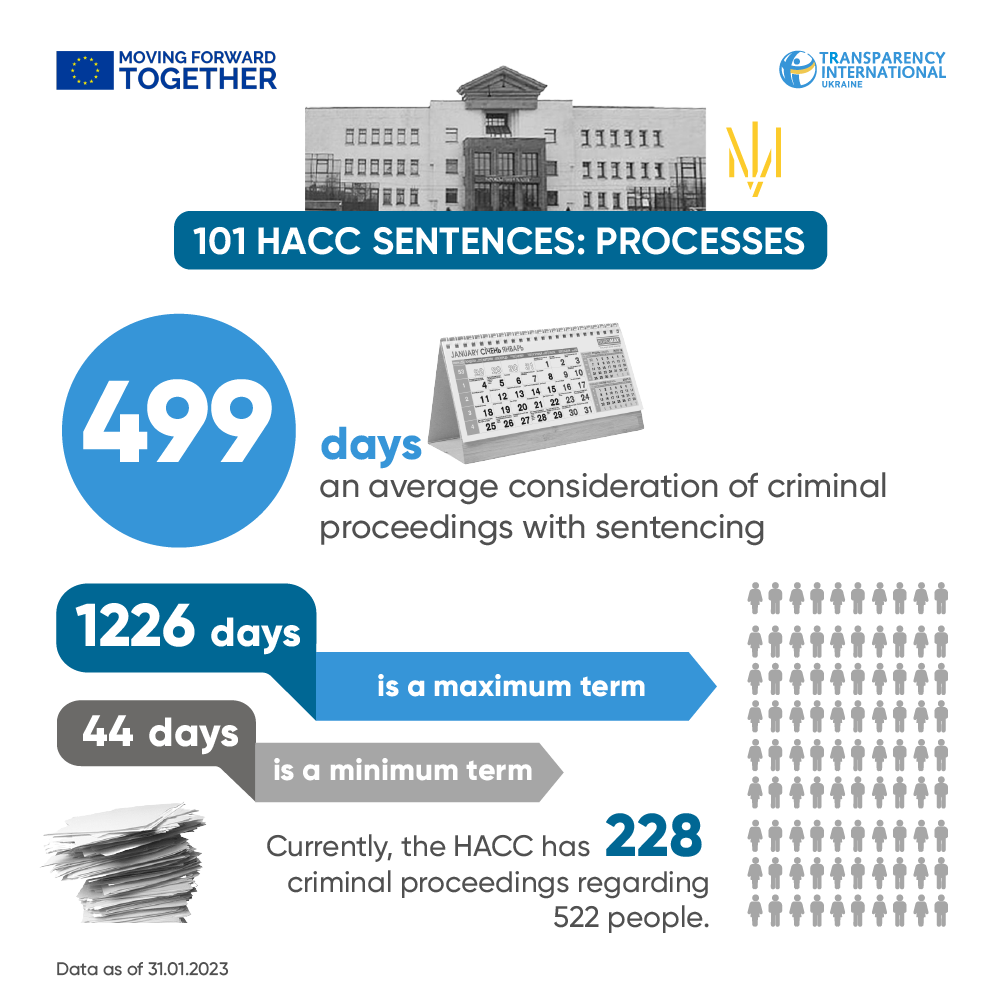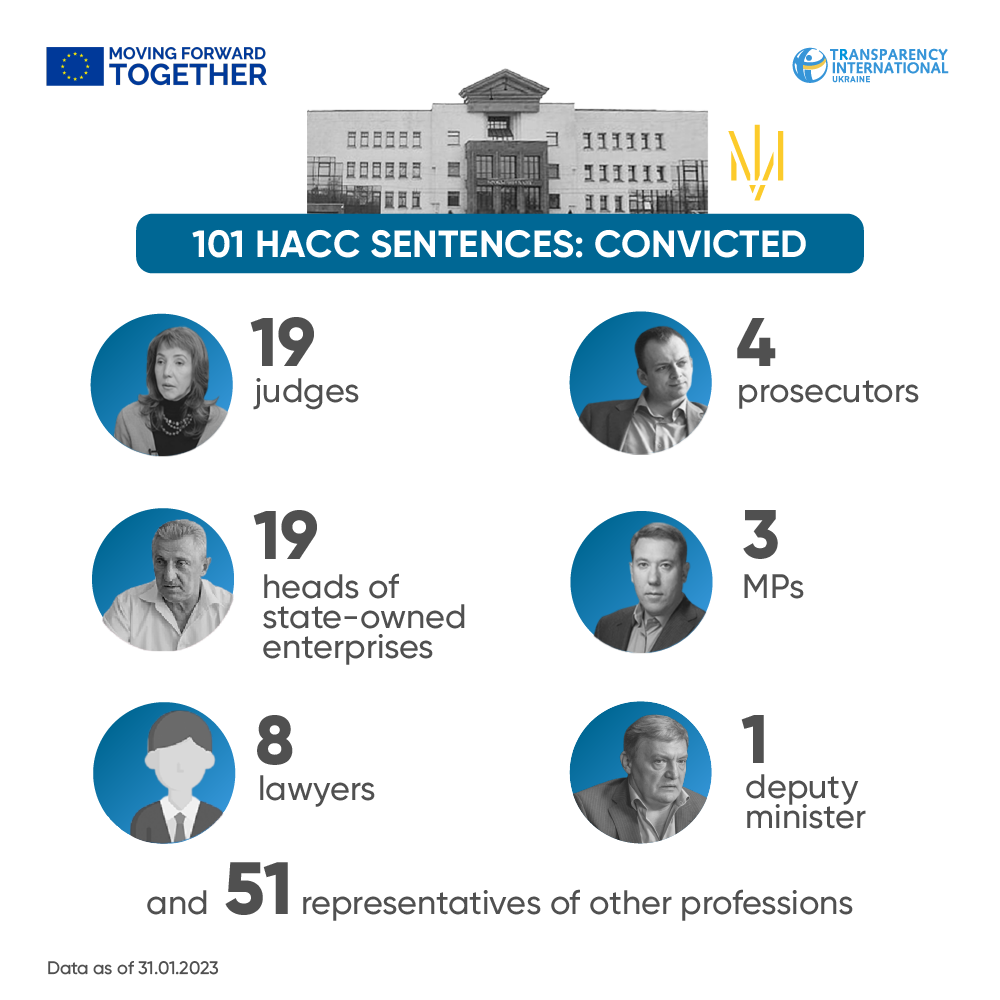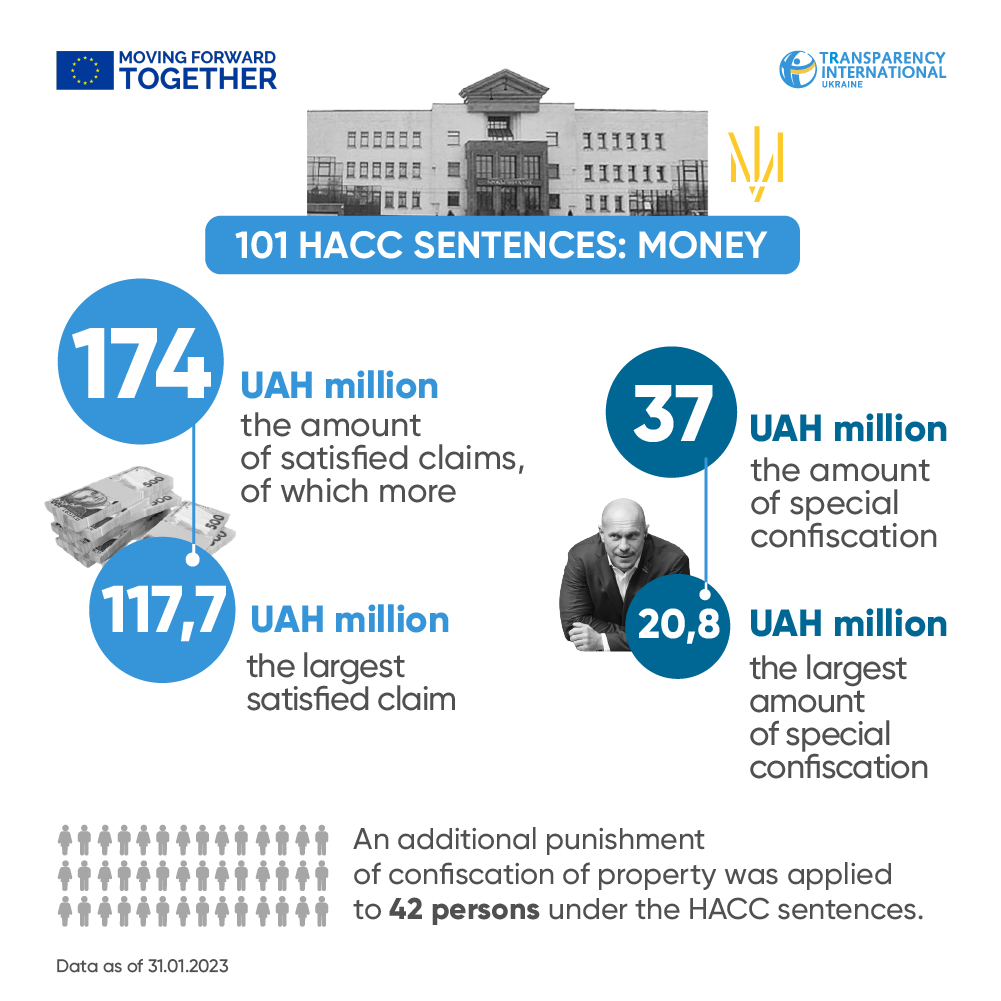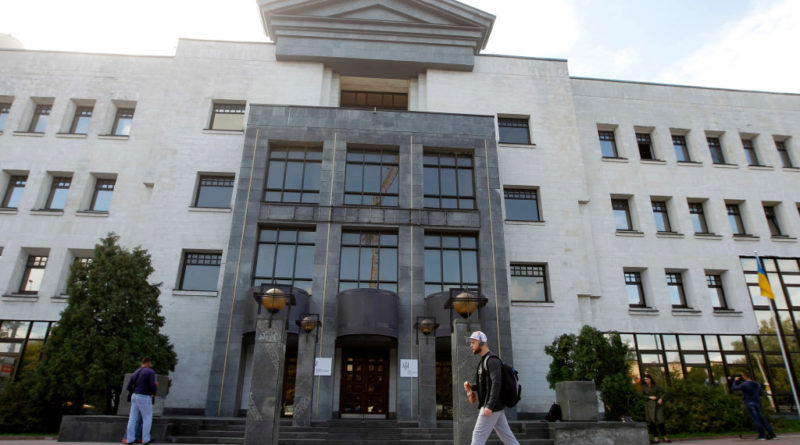

In recent weeks, we have witnessed a considerable number of high-profile suspicions of corruption, searches, and journalistic investigations. However, all these cases will remain headlines if they are not accompanied by high-quality investigations and a fair trial.
Since September 2019, the vast majority of cases related to high-profile corruption have been considered by the High Anti-Corruption Court (HACC). Despite numerous attacks by pro-Russian forces, in more than 3 years, the HACC has managed to prove itself an independent and effective anti-corruption institution, and its judges have already proved their professionalism. The Anti-Corruption Court has demonstrated its resilience not only in stormy times of political turbulence, but also during the war. The HACC continues to work and administer justice in cases of high-profile corruption during shelling and blackouts.
However, the work of the court is not only high-profile sentences and heated trials. Behind the scenes, there are many details that are not written about in the media or talked about on television. So, we analyzed the main performance indicators of the HACC in 3.5 years of operation.
The society is constantly waiting for verdicts for corruption, and for some reason, the opinion has already taken root that bribe-takers continue to live with impunity. But this is not true — after the start of the work of the HACC, the situation has changed quite noticeably.
During the entire period of operation, the Anti-Corruption Court issued decisions in 101 cases concerning 130 persons. At the same time, as we can see, there were 37 sentences precisely in the course of the war year. In total, we have 89 indictments (including 29 by agreement) and 12 acquittals.
79 HACC verdicts were contested in the appeal, 35 in the cassation.
Why did the number of sentences increase in 2022? The fact is that corruption cases are complicated a priori. Often it takes years for them to be considered in court, and the more complicated the case or the more intricate the scheme implemented by the corrupt officials, the more time it takes to consider such proceedings in court. And since we support the effectiveness of the anti-corruption system, the honesty and fairness of sentences, such terms of consideration of cases should be taken with restraint. Moreover, the HACC considers criminal proceedings several times faster than the local courts before its creation.
During the entire period of operation, the Anti-Corruption Court issued decisions in 101 cases concerning 130 persons.
How does the HACC judge?
The Anti-Corruption Court receives cases in which:
- the offense was committed by or in relation to a senior official;
- the value of the subject of the crime or the damage caused by it is 500 or more times higher than the subsistence minimum for able-bodied persons at the time of the crime (on January 1, 2023, it is starting from UAH 1,432,000);
- civil forfeiture is considered — a mechanism that allows recovering unreasonably received assets of civil servants to the national budget.
- the confiscation of assets of russians and other persons who supported russia’s aggression in Ukraine is considered.
In general, these are very different cases. For example, there may be a case of confiscation of assets from russians under a lawsuit from the Ministry of Justice or proceedings for false declarations. Or a complex scheme that was exposed by NABU-SAPO may be considered — it contains dozens of volumes of evidence (for example, in the case of the Rotterdam + formula or the “gas case,” which deals with the schemes of ex-MP Onyshchenko). Moreover, the representatives of the defense and prosecution play an important role in the proceedings — the stronger they are, the more heated the trial and the greater the likelihood that it will be delayed.
That is, all cases of the Anti-Corruption Court are different, and therefore are considered in different ways and require an individual approach and different amounts of time. However, we have an average value and limits on the duration of criminal proceedings.
And given that now the HACC has more than 220 criminal proceedings against more than 500 people, the number of cases that will be considered by the court in 2023 will increase again.
All cases of the Anti-Corruption Court are different, and therefore are considered in different ways and require an individual approach and different amounts of time.
Whom do these sentences relate to?
67 persons were sentenced to imprisonment by the HACC in the form of actual deprivation of liberty (not including annulled court decisions). Among them are, for example, ex-deputy minister of the temporarily occupied territories Yurii Hrymchak, ex-director of the Institute of the National Academy of Agrarian Sciences Orest Furdychko, and ex-deputy of one of the heads of the department of the Prosecutor General’s Office Dmytro Sus.
What else does the HACC do to help the state?
In addition to its direct functions — fair justice in cases of corruption crimes — the HACC also fills the budget of Ukraine. Thus, since February 24, 2022, based on court decisions, the HACC directed more than UAH 1.2 billion to the defense capability of Ukraine.
Where do the funds come from? Firstly, it can be bail money. The court appoints bail to ensure that the suspect/accused will perform the procedural duties assigned to them. Secondly, these are funds seized in criminal proceedings.
The HACC applied additional punishment in the form of confiscation of property up to 42 people, according to the verdicts. Everything what was confiscated was also transferred to the ownership of the state.
What awaits us in the future?
Why indeed should we look back on the entire previous period of the HACC performance? And when can we finally witness the verdicts for the “Big Fish”?
In fact, the Anti-Corruption Court still has such expected proceedings regarding Onyshchenko, Zlochevskyi (the legendary story of the super bribe to the heads of the NABU and the SAPO), Nasirov (yes, the one within which he was covered with a blanket), Chaus (who hid his bribe in three-liter jars and buried them in the garden), Yurchenko (the case of “buns”), Bakhmatiuk, Mykytas (two cases!), and many others. And there are also cases of MPs and false declarations regarding: Shol, Herasymov, Volynets, Pashkovskyi, Kamelchuk, Shakhov.
One should not forget that it is the HACC that also considers the lawsuits of the Ministry of Justice regarding the confiscation of russian assets. Recent cases include the confiscation of property of russian rectors: Torkunov, Falaleev, and Polukhin, as well as five russian parliamentarians Paikin, Liabikhov, Kolbin, Kovitidi and Bakharev.
And in relation to each person involved in these cases, the NABU and the SAPO have their own evidence, positions that will subsequently lead to the final decisions of the Anti-Corruption Court on them. The “Big Fish” will finally receive sentences, and it is very likely to happen in 2023. How many of them will be indictments — we’ll see. But we believe that all these decisions will be fair.
This publication was prepared with the financial support of the European Union. Its content is the sole responsibility of Transparency International Ukraine and does not necessarily reflect the views of the European Union.
The “Big Fish” will finally receive sentences, and it is very likely to happen in 2023.




